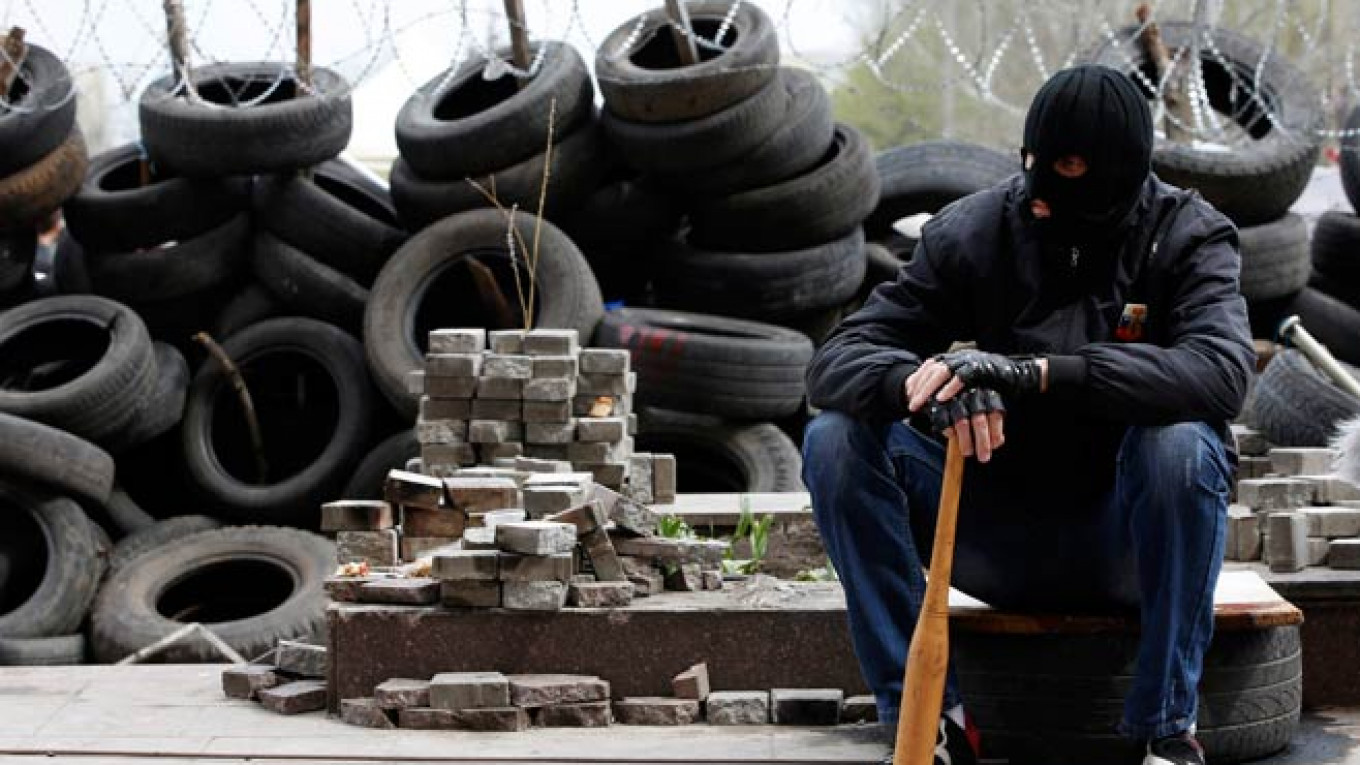Pro-Russian forces in eastern Ukraine on Saturday prepared to celebrate Orthodox Easter at barricades outside government offices seized in nearly a dozen cities, despite an international agreement to disarm and free the premises.
In Donetsk, Denis Pushilin, a co-chairman of the self-appointed Donetsk People's Republic, which is demanding broader regional powers and closer ties to Russia, vowed that insurgents would continue occupying government offices until the new pro-Western Kiev government is dismissed.
"We will leave only after the Kiev junta leaves," Pushilin told The Associated Press outside the occupied regional administration building. "First Kiev, then Donetsk."
Nearby, retiree Kseniya Shuleyko, 65, was handing out pieces of homemade raisin cake, traditionally served for Orthodox Easter. Speaking from a red tent, decorated with a red hammer-and-sickle Soviet Union flag, Shuleyko expressed hope that Russia, which annexed Ukraine's Crimean peninsula last month, would also wield influence in the Donetsk region near the border with Russia, known as the Donbass.
"We believe in Russia. It helped Crimea, it will also help the Donbass," Shuleyko said. "God will help those who believe and we do believe." Moments later, she performed a patriotic Soviet-era song together with other demonstrators and could not contain her tears.
The Easter preparations and fortification efforts come two days after top diplomats from Ukraine, Russia, the U.S. and the European Union issued a statement calling for an array of actions including the disarming of militant groups and the freeing of public buildings taken over by insurgents.
Those terms quickly became a heated issue as pro-Russian armed groups that have seized police stations and other government buildings in eastern Ukraine said they would not vacate unless the country's acting government resigned. At the same time, Pushilin told RIA Novosti that his group could take part in a nationwide roundtable on easing the crisis, which has been proposed by Yulia Tymoshenko, a former prime minister and candidate in the May 25 presidential election.
The insurgents say the Kiev authorities, who took power after Moscow-leaning Ukrainian President Viktor Yanukovych was ousted in February following months of protests, aim to suppress the country's Russian-speakers. Eastern Ukraine, which was Yanukovych's support base, has a substantial Russian-speaking population.
The new government insists it is legitimate and has no plans to resign, having been formed after Yanukovych fled Ukraine and approved by some members of his party. While Russia continues to criticize the new government, it has engaged in direct talks with it. The new government says it is working on constitutional reforms, which will give eastern regions a greater voice in self-governance.
Ukrainian Prime Minister Arseniy Yatsenyuk expressed fear that President Vladimir Putin was seeking to restore Moscow's previous geopolitical and territorial might, however.
"President Putin has a dream to restore the Soviet Union. And every day, he goes further and further. And God knows where is the final destination," Yatsenyuk told NBC's "Meet the Press" in excerpts released Saturday. The full interview will air Sunday.
Russia's Foreign Ministry said in a statement Saturday that deputy minister Grigory Karasin met with Oleg Tsaryov, a pro-Russia candidate in the Ukrainian presidential election that is to take place on May 25.
"The Russian side noted that the questions of resolving the internal political crisis should be decided by Ukrainians themselves in close cooperation with a special monitoring mission" of the Organization for Security and Cooperation in Europe, said a statement summarizing the meeting. "Russia is prepared to show the most wide support in this."
The statement did not specify what that support would be, and it was not clear what it can do or would be willing to do. Russia denies claims that it has agents in eastern Ukraine directing or encouraging the insurgents.
A Message from The Moscow Times:
Dear readers,
We are facing unprecedented challenges. Russia's Prosecutor General's Office has designated The Moscow Times as an "undesirable" organization, criminalizing our work and putting our staff at risk of prosecution. This follows our earlier unjust labeling as a "foreign agent."
These actions are direct attempts to silence independent journalism in Russia. The authorities claim our work "discredits the decisions of the Russian leadership." We see things differently: we strive to provide accurate, unbiased reporting on Russia.
We, the journalists of The Moscow Times, refuse to be silenced. But to continue our work, we need your help.
Your support, no matter how small, makes a world of difference. If you can, please support us monthly starting from just $2. It's quick to set up, and every contribution makes a significant impact.
By supporting The Moscow Times, you're defending open, independent journalism in the face of repression. Thank you for standing with us.
Remind me later.






